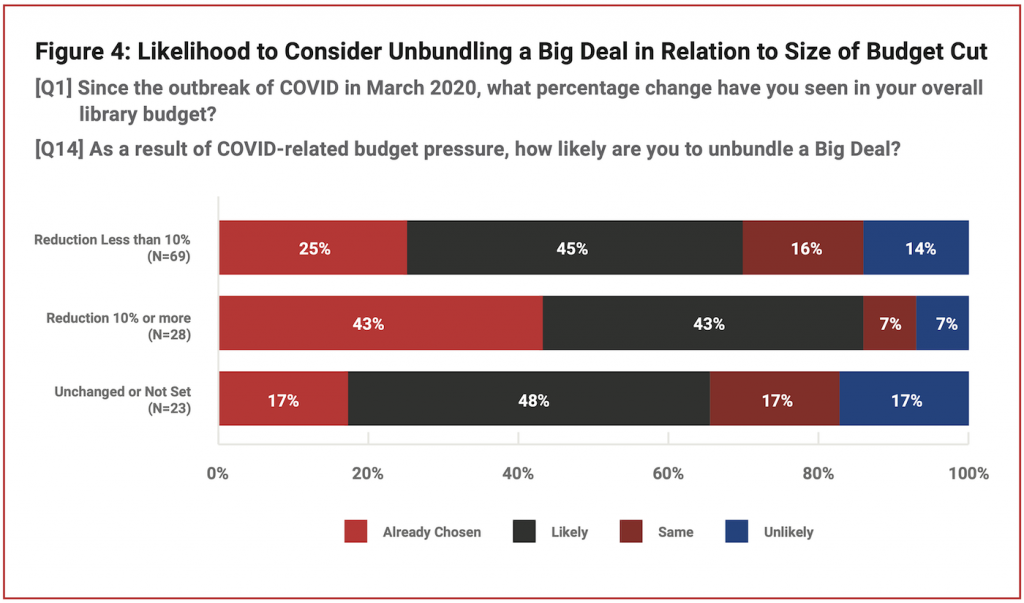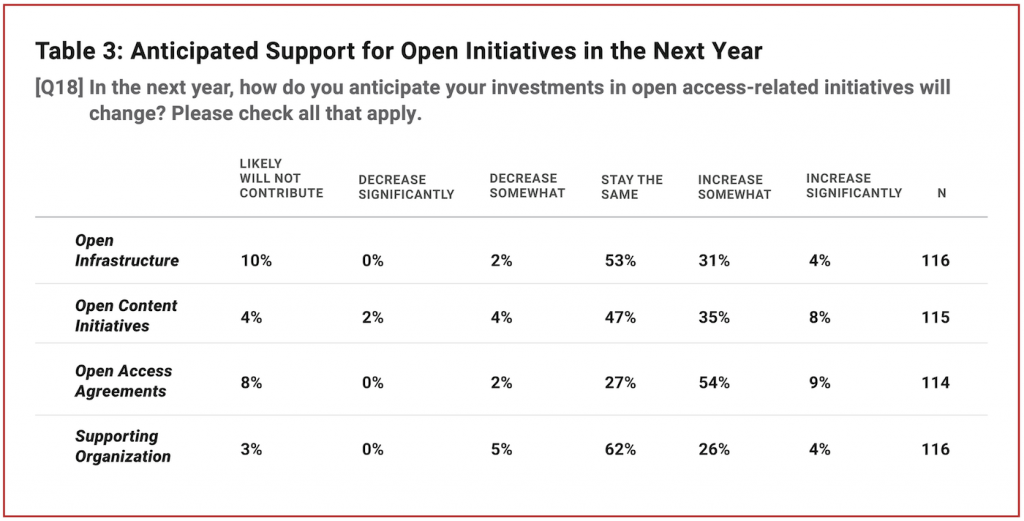Today, SPARC releases the results of its COVID Impact Survey, which was undertaken to better understand academic libraries’ pandemic-related budgetary challenges and approaches, with a focus on understanding how they affected attitudes towards content, collections, and open initiatives.
The full text of the report can be found here.
The SPARC COVID Impact Survey underscored the extremely difficult circumstances faced by most academic libraries as a result of the pandemic—and libraries’ continuing support for open initiatives despite these challenges. This moment has encouraged rapid change, permitting libraries to attempt changes they had considered in the past and accelerating changes already underway. Among these trends were questioning Big Deal agreements, renegotiating prices with major publishers, and continuing support for open initiatives.
 Figure 4 from the report showing the likelihood of libraries facing various levels of budget reductions to unbundle a big deal.
Figure 4 from the report showing the likelihood of libraries facing various levels of budget reductions to unbundle a big deal.
Among the findings of the study:
- Nearly 80% of libraries had to contend with budget cuts as a result of COVID; over 20% reported having experienced a cut of 10% or more; the vast majority of those who experienced cuts anticipate that these reductions will likely be permanent.
- Many libraries reported renegotiating publisher agreements or unbundling a Big Deal, or were strongly considering doing so. That said, in some cases, the need to act quickly and efficiently served to protect major long-term contracts (including some Big Deals), while leaving smaller publishers and one-time purchases (like monographs) exposed as easier to cut with fewer immediate repercussions.
- Across the board, respondents reported investing in open initiatives in a range of ways; most felt these investments were either likely to continue at current levels (50%) or grow (35%) in the year to come.
- For many libraries, COVID-related shutdowns have reinforced the importance of the library as a source for provisioning digital content and for supporting online pedagogy, as demand from faculty and students for online content grew. Many librarians addressed this by shifting resources to providing further support for teaching, whether through digitization of course materials, working with instructors to create or manage online courses, or supporting adoption or creation of OERs.
- Among the concerns raised by library leaders were the long-lasting impact of having run libraries absent their physical spaces, the impact on staff morale, and an inabil- ity to move ahead with new plans.
 Table 3 from the report showing libraries anticipated support for open initiatives in the next year.
Table 3 from the report showing libraries anticipated support for open initiatives in the next year.
Overall, responses indicated a very intentional spirit of experimentation, born of necessity, resulting in creative problem solving concerning spaces, personnel, and collections. This report will help to inform the SPARC agenda in the months ahead as library leaders adjust to campus life post-pandemic. While the more dramatic budgetary and space restrictions of the past year will hopefully disappear, the value of having openly available materials for research and teaching has never been more clear.
The report was produced in collaboration with Nancy Maron, founder of BlueSky to BluePrint, and Juan Pablo Alperin, co-director of the ScholCommLab and associate professor at Simon Fraser University.
This report would not have been possible without all those who generously volunteered their time to answer our questions. We are grateful for each survey response and would especially like to acknowledge the contributions of those who agreed to be interviewed during a busy and challenging time, including: Janice S. Lewis and Mark M. Sanders (East Carolina University), Kevin Engel (Grinnell College), Elizabeth Mengel (Johns Hopkins University), Rebecca Richardson (Purdue University), and Frances Maloy (Union College). Similarly, this project would not have been possible without the support of the SPARC Steering Committee and financial support of the Open Society Foundations. Finally, we would like to thank early readers for their edits and corrections that have contributed to the accuracy and clarity of this report.